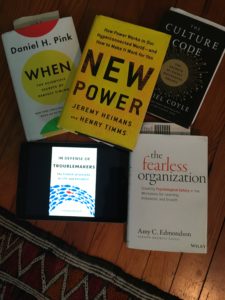 These five business books from 2018 already have either validated or transformed the way my clients and I work. Even better, their actionable ideas are based on science.
These five business books from 2018 already have either validated or transformed the way my clients and I work. Even better, their actionable ideas are based on science.
Keep in mind, my book list is intentionally short to avoid adding to your cognitive load and end-of-year stress levels.
The books are listed in no particular order. And as explained later, four of the five share a connection.
- When: The Scientific Secrets of Perfect Timing by Daniel Pink. A 2018 Goodreads Choice Awards finalist, this book presents the scientific evidence for why we need to pay close attention to “when” we do something. Even though we think and talk incessantly about time, we often don’t use it as intentionally as we should. As a result, we put our performance, health and other aspects of our well-being at risk. (For more, check out Why you need to pay attention to “when”.)
- The Culture Code: The Secrets of Highly Successful Groups by Daniel Coyle. Coyle maintains that we’ve been approaching culture the wrong way. It’s something you should deliberately build, not something that is. Based on his interviews with leaders of high-performing teams and the latest in the social sciences plus neuroscience, he offers three culture-building strategies. They are: 1) build safety; 2) share vulnerability; and 3) establish purpose. (For more, see Why you need safety for a high-performing culture.)
- The Fearless Organization: Creating Psychological Safety in the Workplace for Learning, Innovation, and Growth by Amy Edmondson. Edmondson invented the term “psychological safety” that Coyle uses in his book as the foundational skill for building culture. In her just-published book, Edmondson explains why knowledge workers need psychological safety to collaborate and be innovative, citing her research and others’ studies. She also provides a step-by-step framework for establishing psychological safety in teams as well as in entire organizations. (For my take on how you can still use your voice without full psychological safety, see How to speak up and stop the toxic silence.)
- In Defense of Troublemakers: The Power of Dissent in Life and Business by Charlan Nemeth. According to the author and her research, if you make the effort to seek out and listen to just one dissenting voice, you can reap three distinct benefits: 1) bigger thinking; 2) better thinking; and 3) better decision making. While the book presents extremely useful concepts and practical ideas and is a helpful complement to The Culture Code and The Fearless Organization, be warned that it would be a better article than book. (For more tips, check out How to use dissent to your advantage.)
- New Power: How Power Works in Our Hyperconnected World—and How to Make It Work for You by Jeremy Heimans and Henry Timms. The current connectivity that we humans now have through technology—or hyperconnectivity according to the authors—is influencing how we think and act about power. “New power” is open, participatory and peer-driven; it’s a force (or “current”) that many make. By contrast, “old power” works more like currency. Those in power, or those who seize it, jealously guard it and aim to make others comply with their orders. “Old power” and “new power” are not a binary choice. In many cases, they’re blended. However, for leaders to build credibility and respect with a broad base of stakeholders, they need to learn how to use new power. (See my blog post 3 “new power” skills that make you a better leader.)
After compiling the list, I realized that four of these books are connected (three directly and one linked) to the relatively new Next Big Idea Club that I joined in November 2017 when it launched.
The media start-up, Heleo, teamed up with best-selling authors Malcolm Gladwell, Susan Cain, Adam Grant and Daniel Pink to curate the books—two non-fiction books each season—for this very modern book club.
As a founding member, I’m enjoying these benefits: science-based books about provocative, life-changing ideas; reading aids and short videos; a private Facebook group for discussion among all the members and the authors, often supplemented with video interviews with the authors; and a community service component. For every sold subscription, the club donates two books to children in under-resourced communities.
Even though I pay attention to new books, the book club has exposed me to a number of books I doubt I would have discovered on my own, including these three: New Power; Uncensored: My Life and Uncomfortable Conversations at the Intersection of Black and White America by Zachary Wood; and Endure: Mind, Body, and the Curiously Elastic Limits of Human Performance by Alex Hutchinson.
Plus, fellow book club members are also recommending treasures. For example, when three people in three different Facebook threads were talking about the 2017 book, The Death of Expertise: The Campaign against Established Knowledge and Why it Matters by Tom Nichols, Professor of National Security Affairs at the US Naval War College and five-time undefeated Jeopardy! champ, I realized I should read it. I’ve now recommended this enlightening book to many others.
You’re welcome to join us in the club. Meanwhile, what are your favorite books this year from a professional development perspective?
Please share what you’re reading!

Thank you Liz. I look forward to checking out the three books that are new to me. I also agree that The Next Big Idea Club is a fantastic source of ongoing learning and community.